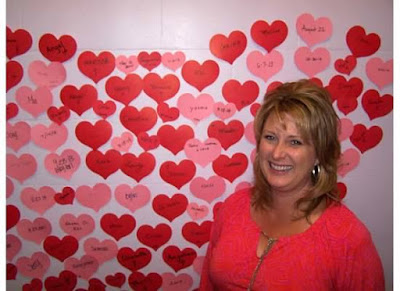In-depth interview: Kristi Burkhart, Executive Director, Pregnancy Care Center
Personal Background:
I really enjoy being able to teach and encourage people through my job. I love training volunteers and watching the lights go on as they explore what they think they know about our clients and who our clients really are. I love teaching youth about healthy sexual integrity (and shocking them with my perspectives, which aren’t too far from their own!) I can help them realize they truly are responsible for their own boundaries and need to decide for themselves what is best, but only after understanding the potential consequences of sexual intimacy. I love when I can encourage those who are struggling, letting them know that they are not alone and that there are good answers available. My job allows me to help clients, volunteers, staff, or donors, whether the issue is unexpected pregnancy or something entirely different.
There are never costs to our clients. All services are free and confidential. We do not bill any insurance provider either, so our services are also free to the tax payer. We are 100% funded by this community and for this community through one-time and monthly donations from individuals, organizations, and churches. We have four PCC annual fundraisers: a banquet, a “Change 4 Babies” campaign, a Men’s BBQ, and a Ladies’ High Tea.
I think the more common circumstances are that the girls are young, unmarried, and still in school (high school or college). 59% of our clients are between ages 15 to 24 (10 year age range), whereas only 40% are between ages 25 to 50 (26 year age range). Less than 1% of our clients are under age 15. We also often have single moms come in who are separated or divorced and who find themselves unexpectedly pregnant.
Your clinic is located across the street from an abortion clinic. Tell us what that is like.
Our center and the clinic have some shared clients. Sometimes a woman comes through our door for her “appointment” and we can tell that she probably meant to go to the clinic instead (most of the time she won’t say the word “abortion” and she’ll have a hard time looking at the receptionist). Even if we are pretty sure she has an appointment with the clinic, we still have to ask what the appointment is for, in case she actually does have an appointment with us for a pregnancy test or an ultrasound. If she is looking for the clinic instead, we tell her she doesn’t have an appointment with us and ask if she is sure she is pregnant. We offer her our services. These conversations sometimes lead to an appointment with us instead of an abortion. Other times, she walks out the door and we don’t see her again. Our job is to be here and available in either case. Sometimes she leaves, but returns again.
PCC is also affiliated with two national organizations that provide training materials, conferences, policy suggestions and so forth. I find these organizations to be those of integrity that I can personally align with. As Executive Director for PCC, it is important for me to understand the organizations PCC is directly associated with and their leadership.
With that said, there are a few pregnancy resources centers and pregnancy medical centers that do not follow all the guidelines set before them by the national organizations to which they are affiliated. This is a travesty and misrepresentation of the rest of us, and it greatly angers me.
I understand that everyone comes into this type of pro-life work to serve with a genuine heart for women and babies. We are sincere but we also usually come with an agenda without even realizing it. If our service to our clients is not based on love, truth, and integrity then we should step aside. It takes good training and more good training to be ready to serve women with unexpected pregnancies.
difficulties she faces: in her relationships, in her schooling or career, in her ability to provide basic necessities, etc. Don’t shoot from the hip. You are dealing with at least two lives here. Set aside your own agenda, and remember: love, truth, and integrity.


Leave a Reply
Want to join the discussion?Feel free to contribute!